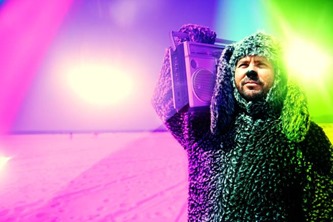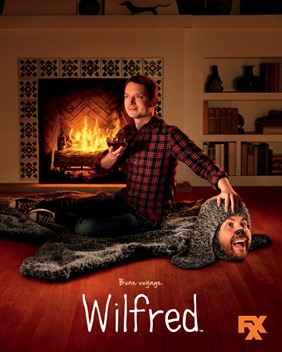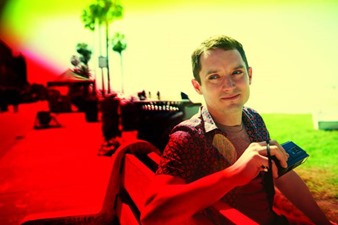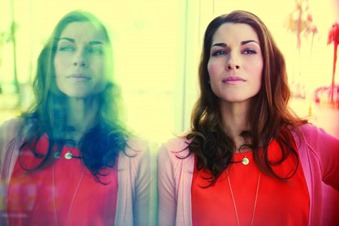FXX’s Wilfred premieres its final season this evening (10/9C) and late last week, we had the pleasure of taking part in a conference call Q&A with series creator/star, Jason Gann.
Creatively, the series may have been a bit too far into the absurd to maintain a large audience, but it was always thought provoking and smart – something that continues, and remains hard to explain in a sentence (‘It’s about a depressed guy who gets life lessons from a selfish dog with a short attention span who is played by a guy in an obviously fake dog suit’ doesn’t even begin to capture the wonder and the weirdness that is Wilfred). Gann, as usual, was smart and genial – and we wouldn’t be surprised to see Wilfred reappear in some other incarnation at some nebulous point in the future. For now, it is what it is – and that is hugely entertaining.
Hi, Jason. Thank you for doing the call today.
Jason Gann: Oh, hi.
In the beginning episodes you could just see a lot of other people kind of running around in the “Wilfred” suit. What was that like for you?
Jason: It was kind of surreal, but I think everyone else on the set was more sensitive to the preciousness of it, the sanctity retained, the sanctity of Wilfred. I think the only other person who had really been in it before then was Elijah [Wood], once, in between scenes last year. It was just so exciting, the whole new direction that we’re taking with some of the mythology of Wilfred that it was just a real buzz for me to be in the suit, and see some other people in it.
There was one guy in it who, he stayed in it all day, like it was so hot, and he didn’t take it off all day. I’m like, “Dude, what are you doing? Take it off in between takes.” He’s like, “No.” He said, “This is just such a gift of an opportunity, I just want to stay in it for as long as I can.” It was pretty funny.
I’m wondering, the mythology of the series from the very start, the very concept to now, has it changed or did you always have the same idea in mind?
Jason: It’s definitely changed. Even from the pilot of the FX series, no one knew what happened beyond that pilot, and it just morphed into its own creature. I mean, even when we changed show runners for Season 3…was really when the statue came in at the end of Season 3 and we knew where we wanted to take that.
When David Zuckerman came back onboard as a show runner this final season, we were kind of tied into that. But at the same time, we were really aware of doing more than one theme, which has been probably the only thing that has been consistent through the FX series is that there can be different answers depending on the interpretation. There’s no cut and dry, spoon-fed answer. Yes, I think my series pretty much kind of worked out if you get picked up again for another series when there’s nothing on the playing field. When we write a season we give everything because you never know when you’re coming back and when you’re not. We’re so blessed to be given this last opportunity to really have one last hurrah, and end the show on our own terms.
To answer your question, I mean, but even to go back before FX series to when it was a short film, which was back in 2002, it was certainly a short film. It was a conversation between two dudes, one of them happened to be a dog, and even then people were saying, it’s a great idea, but it would never have gone beyond the seven minutes. When we decided to make a pilot for an Australian series, we were like, I can’t imagine that after seven minutes I think this idea doesn’t have legs, and I was, no, no. This idea has got a lot of legs, and here we are. We did two seasons in Australia; we’ve done four seasons here.
Wilfred is [indiscernible] now; the characters are for history to judge. It’s just like [indiscernible] you never really know where something small can take you, but I’m tremendously proud of where we have taken it though. It’s like now that it’s come to its proper conclusion, and it feels like a full conclusion, all the little steps along the way seem to make sense in a new way that they didn’t at the time; we got to the destination.
I was wondering, did FX make the decision to just give you one more season or was this more your idea or is it sort of mutual?
Jason: No, it was a network decision. I don’t know too much about the details, but I have noticed a couple other shows have also been brought to a close. Also, FX has an enormous amount of new shows, so it feels probably the end of an era. We feel really lucky that there was a great show of respect that we were given this opportunity to bring the show to its conclusion, even though the show may not have been like a ratings sensation.
I think that FX has been really proud of what we’ve done creatively, and the painting has been completed and it’s there for everyone to see now. I do believe that history will be kind to the TV show that is Wilfred over the years, and that’s going to be fun to watch the response grow. I mean, even the Australian show, over two years, breaking in between seasons because it was finished, but it just—word of mouth, it just kept slowly growing. We’ll see what happens [indiscernible].
Also, David and I, we did talk about—I think we’ve mentioned it in early interviews, that we kind of saw this thing like a four or five season show. We are really pleased with the end result. I don’t know how many more years I could’ve stayed in that dog suit anyway.
The first two episodes are extremely twisty and fascinating and very mythology heavy. It kind of felt like there was a creative upsurge. Do you think the fact that it is the final season that you guys were able to let loose creatively?
Jason: Yes. Well, let loose and also be kind of restrained at the same time. I guess the main frustration, for me personally, with such a heavy mythology strand—part of that show is that the first thing to go is the comedy in an edit. I’ll always fight for the comedic moments, but when it comes to story, story’s got to come first. We had so many loose ends to tie up in ten episodes that certain things like…, for instance, in the basement, we don’t have any this season just because we just couldn’t fit them in time-wise.
But having said that, yes, we really did get to do some crazy scenes, some you don’t see in the first couple of episodes, but towards the end of the season, I’m certain that no one’s going to predict where we take it.
We didn’t have to worry about ratings anymore. I mean, Season 3 we kind of thought that maybe we’d gone too mythology heavy in Season 2, and perhaps too dark. I think we lost a section of our audience because it wasn’t as funny as, I think, Season 1 promised it to be, and a lot of people did tune in for the comedy.
Season 3, we really tried to steer it back closer to where we were Season 1, and make it really comedically satisfying. I really felt we achieved that, but it wasn’t enough, I guess, to extend the [indiscernible] of viewership, I guess. This season we didn’t have to worry about trying to win back numbers; it was just about creating a satisfying conclusion for us as the creators, and we’ve done that.
Over the years I’ve talked to a few filmmakers that have said usually the work you do is a little bit of a reflection of yourself. Writers try to incorporate what they’re feeling and what they’re thinking and what they’re experiencing in life into their work. Is this something that you agree with? Are there any episodes that you’ve written or contributed to that reflect who you are in any way?
Jason: Without a doubt, mate. That’s a great question, and I’ve been a great observer of this whole symphonicity [sic] sensation; it’s just incredible. I noticed that even though when I was an actor in my theatre days I couldn’t believe how the roles I was playing seemed to, not mirror identically, but resemble greatly, what was really happening in my life, how I was perceived. Wilfred is certainly a dog on steroids, but it’s weird because some of these scenes of parallels between “Wilfred’s” life and my own life happen when I’m not even writing it anymore. It’s a bizarre situation.
Last year Wilfred got married to Bear, and I got married and these are [indiscernible]. There was a baby who was born, and I had a baby; the [indiscernible] the literal things, but there are many, many things that are really close to home. When I first did the short film, and I showed it to my friends back in [indiscernible] my friends just said, that’s just you in a dog suit. Over the years Wilfred becomes that creature, and David will say, even though it’s you it’s not Wilfred; I don’t see Wilfred when I’m talking to you. I’m glad that my life isn’t literally reflective of Wilfred Season 4, for reasons that shall be revealed, but it is definitely a very strong symphonicity.
When you look back on Wilfred, is there a particular episode or moment that you think represents the show as a whole?
Jason: Looking back? I mean there’s so many—I mean, I gravitate towards—personally, there’s a skit that I wrote and [indiscernible] screened at Comic-Con, the ones where really hit the comedic highs like, I think maybe the doggie dancing one, Avoidance, where we have a really great mix of comedy and the drama. Yes, I think the churro stuff where we think that Wilfred wants a [indiscernible] from Ryan but he really wants a shake to shiver off the churro after eating the churro. For me, personally, those are the really magic moments. Elijah and I just worked out ourselves those dances. I watched the episode the other day and, to me, that kind of captures that real comradery between Ryan and Wilfred.
I was wondering what is next for Jason? What do you have coming up after the show is over?
Jason: Well, I’ve got an animation that’s with Fox at the moment, which is really exciting for me. I’m working with a producer called Nicky Weinstock. I met up with him over a year ago, and he just said to me like he just wanted to work with me on something, and the feeling is mutual. He just seemed to think that my imagination would work really well in an animation platform, and I had to agree.
Since Season 1 of Wilfred and with FX, I can’t tell you how many times I’ve thrown my arms in the air when I’ve pitched some crazy idea and had everyone say, we can’t do that, we can’t do that. I think the semen ants in Season 1 and I pitch it every year, and even Season 3 they’re like, semen ants, just get it through your head, semen ants will never be in the show. Later on in the year someone else will be looking for something and someone said, I think that’s semen ants and Eli [Jorné] said, I can’t believe that semen ants made it in the show. There’s a reference to semen ants but it wasn’t actually the story of semen ants developed, it was the genuine pitch.
When I was pitching the concept of the show to Fox Studio, and now we’re like, the semen ants, that’s that show, they were joking thankfully. This was kind of like, I don’t have to do it anymore. For a show that’s already really crazy and out there for ideas, the fact that I’ve had so many ideas that have always been told was too crazy for even Wilfred, I think there’s a sign that this is a really good area for me to write because there are no bounds with imagination. You’re not bound by actual logistics of shooting it, so I’m really excited about that.
I’ve got another three live-action shows that I’ll be pitching as soon as I enjoy a little bit more of a rest, and come back into town and start pitching again. I’ve always got five or six shows in development with my producing partners I’m ready to pitch. Actually, for the last—I think every season of Wilfred I’ve always had a loose show, which would be a starring vehicle for me, really in case Wilfred got canceled. That’s the one benefit of being a performer, as well.
You said that originally you thought the show could go about four or five seasons. Do you feel that you’ve hit all the points you need to hit by the end of this season, or could we by chance maybe see Wilfred in another medium like in the movie theatre or something like that somewhere down the road?
Jason: It’s difficult to say. Look, I definitely feel like we’ve laid it to rest, the story has been told, but you never say never. Both Elijah and I and several other key players have definitely expressed a keen interest in being involved in any future potential film [indiscernible]. I really think that’s a little out of our hands. Personally, it’s out of my hands, I just hand it over to [indiscernible]. If we’re lucky enough to have continued increasing support from our fans, over the years other shows have come back because of people—Arrested Development, stuff like that, that people have rediscovered after they’ve come and gone. If something like that happens then we may come back, but I don’t think it would ever be in the TV area again.
I’ve also toyed with the idea of going back and doing another Australia season again. All of these things would have to be in a couple of years when I really—I’d have to have a good reason to do it because I don’t want to tarnish what we’ve created in any way with something cheap. Elijah, from what I’ve spoken about, would feel the same way. I’d say it would be a couple of years before I get in the suit again.
I wanted to ask about the characters in the new world that you’re introducing in the season. Generally after the first two episodes you’ve taken away some of the major elements of the story, so far, with Ryan’s father, Jenna and Drew. Talk about the formation of this new support group.
Jason: I don’t think any of them are major foundation characters like Jenna or Drew or Kristen or the mum; but they’re all there to really service the arc, the mythology and the arc. We’ve got [indiscernible] this year and he’s mesmerizing to watch. I felt like it was a real pleasure to work with him, but even if for one episode. Again, his episode, I think, is probably the craziest we’ve done in anything, and you really see Wilfred in a [indiscernible]. It’s going to blow people’s minds when they see what we do in that episode.
I have to say that I don’t think—really this season, the new characters that we’ve brought in, make a huge impact aside from forwarding the story and of the mythology of Wilfred and the history of “Wilfred” and “Ryan’s” life. Having said that, we’re really, really excited to have everyone onboard. They’re some brilliant actors and we’ve got Mimi Rogers who, this season, has taken over the role of the mother, and she really is just, I think, a revelation. I love Mary Steenburgen, who is fantastic in the role, too, but Mimi, she wanted to be in it from the start and she’s actually a fan of the show and has never missed an episode. She just took the opportunity with buttered hands and breathed new life into it.
Also John Michael Higgins who has, up until now, played just a certain kind of two-dimensional character, his character just comes alive, and the scenes between him and Mimi are just wonderful. I really miss the fact that—that probably was the theme that mostly made us wish that the show could go on just so we could see more of these characters. That took [indiscernible] by surprise.
If you have time for one more follow-up, this is a question about Kristen. Do we get to explore her potential abilities to see Wilfred or maybe not see Wilfred or other animals?
Jason: All I’ll say is that all of our recurring guest characters are drawn to a satisfying conclusion. Yes, I think she’s no different. I won’t go into too much detail about what happens to her in the end.
Okay, fair enough. Thank you, Jason.
Jason: Yes. Pleasure.
Photos by Frank Ockenfels/Courtesy of FXX



